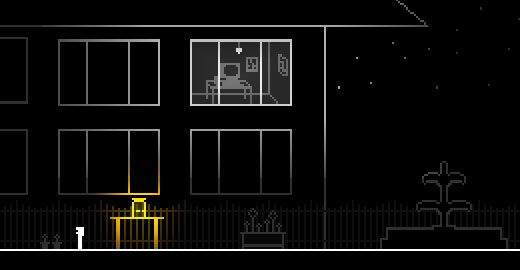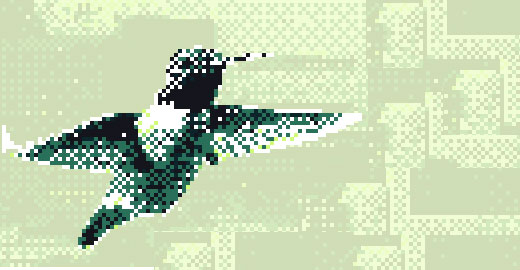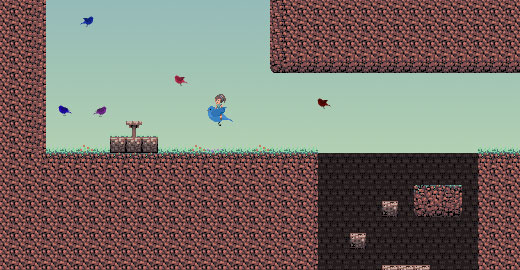There is often no-one more critical of an artist's work than the artist himself. Some have been known to destroy their creations, having spent months - years in some cases - painstakingly creating them, so infuriated were they by some minor imperfection that only they could see. Game developers - being highly creative people too - can also be somewhat self-judgmental on occasions.
Take Jake Elliott, a Chicago-based game developer who has gained a reputation as a creator of arty, thoughtful games. When he completed an underwater exploration game called I Can Hold My Breath Forever, he was so disappointed with what he had made that he came very close to shelving it. "I honestly didn't think anyone would like it, and I almost didn't release it," he says.
Had he kept it to himself, however, we would have been deprived of a gem of a game. I Can Hold My Breath Forever - in which you have to dive ever deeper into a labyrinthine underwater cave system to find your lost friend - has received widespread acclaim, and has been played by hundreds of thousands of people. It also gained an early slot in out list of Top 10 games that make you think about life.
But self-criticism is not always a bad thing. It can also drive people to greater creativity. This is certainly true of Jake. Inspired by arty game developers such as Gregory Weir and Daniel Benmergui, Jake has spurned mainstream game formulas of killing and resource management, focusing instead on thoughtful games that explore deeper themes.
 I Can Hold My Breath Forever
I Can Hold My Breath Forever
I Can Hold My Breath Forever is a charming underwater exploration game about friendship
His latest game, A House in California - an old style point and clicker - is deeply influenced by the concept of nostalgia. I Can Hold My Breath Forever meanwhile is an exploration of the nature of friendship. For another of his games, Hummingbird Mind, Jake has drawn his inspiration from works of literature. Story-telling, indeed, is a stand-out feature of many of Jake's games.
Jake's latest project - a game called Beulah and the Twelve Towers - is due to be released shortly. If it is half as interesting as his previous creations, we should be in for a thought-provoking treat. Let's just hope he decides it is good enough to show us!
Jake kindly agreed to answer some questions for us:
How did you get into game development?
I've been playing indie and experimental games for the last seven years or so, and my professional life is a mixture of programming, making electronic art and occasionally teaching, but while I had wanted to make games for a long time there were a couple of hurdles that kept discouraging me.
One was that I had no idea what the architecture of a complete game would look like, code-wise, and the other was that I had very little confidence in my ability to make the artwork for a game; animated sprites and backgrounds etc. But around October 2009 I encountered Adam Saltsman's Flixel engine and also the TIGSource Assemblee game jam. Flixel is a Flash game engine that's really easy to get started with and easy to build on, and the Assemblee jam was all about artists and musicians lending their sprites to programmers to make video games where neither the artist/musician or the designer/programmer had total control over the outcome. I made a game called Dog and Bone Are Friends for that jam. After completing my first game, I got the bug and it's grown into an all-consuming passion.
You have recently released an intriguing point and click game - A House in California. Tell us a little about what you wanted to achieve with this game.
I had a few different goals with this game. First, I wanted to experiment within the framework of the classic adventure game - games like King's Quest or The Secret of Monkey Island - but make the verbs more poetic than functional. Like rather than "pick up" or "push" you have "remember" or "befriend". Also I wanted to treat the idea of nostalgia; nostalgia for old video games, for family memories, and so on. Nostalgia is a pretty profound and complicated way to relate to something, I think; it's like a combination of memory and wish fulfillment. Indie and casual games are so often nostalgic - they use pixel art or even emulate the palette of a specific old machine like the Super Nintendo or ZX Spectrum. So I play a lot of these games and I'm immersed in nostalgia, and I wanted to try my own take on it as a subject.
 A House in California
A House in California
A House in California is an old-style point and click game inspired by the concept of nostalgia.
Your games always have very imaginative, thought-provoking themes. Where do you get your inspiration for your games?
Thanks! I draw inspiration mostly from fiction. Dog and Bone Are Friends and Beulah and the Hundred Birds were inspired by children's books. Hummingbird Mind was inspired by slice-of-life short fiction (Larry Fondation's Deportation at Breakfast is one of my favorites) and also magic realism, like Franz Kafka or Gabriel Garcia Marquez.
My working process is also pretty textual or literary - I tend to start with a title and then form a game around it, which I realize is a pretty absurd way of working, but titles have an interesting history in art in the last 100 years. The French conceptual artist Marcel Duchamp said that the title of a painting was an "invisible color". And then you have a lot of artists who refuse to use titles, which is an interesting gesture I think. The only untitled game I know of is Untitled Game by JODI.org.
Story-telling seems to feature strongly in your games. Why is that?
Yeah, I like to think of it as "story-telling" rather than just "story" because story-telling is also about the person who is telling the story and the person who is listening to the story, not just the story itself. Games are great at developing that relationship - the player has an active and vital role in the telling of the story.
Quite a few of your games - I Can Hold My Breath Forever and Dog and Bone, for example - explore the nature of friendship. Is friendship a favourite theme of yours in games.
When I started making games I made the decision that I wanted to avoid violence and competition for resources, mostly as a constraint for myself because I thought that it would push me in some interesting directions instead of just reproducing so many of the games I've played that are about violent conflict and scarcity. Interpersonal relationships are definitely a favourite theme of mine and I'd like to continue to explore the complexities of friendship, but I'm also working with other ideas now.
What should games be about?
I don't think there's a single answer to that question, but I do think that all games are about something. A lot of games are about fighting aliens, for example, and if you decide to make a new game that's also about fighting aliens, you aren't just bypassing making up a story; you're also reaffirming the idea that aliens need to be fought. So as a game developer you can never really avoid deciding what your game is about; at best you can just leave it in someone else's hands, and why would you want to do that?
 Hummingbird Mind
Hummingbird Mind
Hummingbird Mind, an interactive story about distraction, daydreaming and working from home.
Do you think games can be considered to be art?
There are two definitions of the word art that have been personally useful, and games fit both of them. One is that art is the part of culture that gets exhibited, bought and sold in galleries and museums. Games have been doing that for decades, even video games. The other definition - the one that I like best - is that art is what an artist makes; and an artist is anyone who takes on as their life's work the project of creating and understanding aesthetics in culture. Clearly that's happening with video games now.
Can arty games be a commercial success?
I personally haven't worked it out yet but I think others have, which is very inspirational. Gregory Weir is able to support himself with his games, and they're definitely arty! Tale of Tales and Thatgamecompany are also pretty inspirational examples. It's something I'd like to figure out, but I'm supporting myself with freelance work now so it's not an immediate crisis - which is good because I'm still finding my feet in game development.
Which of your games are you most proud of?
A House in California is the largest game I've completed yet. I really pushed myself as a visual artist and in the scale of the project, and I also took some risks that I feel very good about. I also am very happy with Hummingbird Mind because it's so small-scale.
What do you consider your most successful game?
I Can Hold My Breath Forever has been the most widely played game I've made, which really shocked me. I honestly didn't think anyone would like it, and I almost didn't release it. I'm glad I did, though; it's very encouraging to see hundreds of thousands of people playing this game and talking about it, and I love to get emails and comments about it from people asking questions or offering their interpretations.
What game are you working on at present? Is there anything you can tell us about it?
I've got a few projects in development. Probably the next one to be released will be a sequel to Beulah and the Hundred Birds called Beulah and the Twelve Towers, which is almost done. I'm also working on some 3D games using the Unity engine, and a Facebook game that will be like Hummingbird Mind.
Do you do both the art and programming for your games. Which of these two disciplines do you prefer?
For most of my games I've actually used found art; some from the Assemblee game jam hosted by TIGSource and some from Creative Commons licensed photographs I took from Flickr. For the new Beulah and the Twelve Towers game, I contracted artist Ben Pettengill (who made the original sprites and tiles for Beulah and the Hundred Birds) to make new graphics, and I'm working with my friend Tamas Kemenczy who is art directing one of my other projects. I'm not really very good at visual art; A House in California was a stretch for me doing all the characters and environments by myself. I like the idea of partnering with visual artists and musicians on games - that's something I plan to continue doing.
Is it possible to make a good living out of developing casual games?
I personally am not supporting myself with games, but it seems to be working for some other folks.
Are their any game developers whose work you particularly admire?
Yeah, absolutely! Daniel Benmergui, Gregory Weir, Anna Anthropy, Increpare, Cactus and Tale of Tales are the developers I admire most right now. A couple of weeks ago I met Kurosh ValaNejad at a conference - he is working on a game called The Cat and the Coup, which I had the chance to play and really fell in love with. There's just so much exciting activity around games now.
What is your favourite game by another developer?
There are a lot; the first that comes to mind is Increpare's Queue although it's kind of an anti-game. It was the first thing I played by him and it really jarred me and expanded my thinking about games. I'm so glad I found it and the rest of his work.
What are your plans for the future?
I'd like to expand my business Cardboard Computer into doing more writing about games in addition to developing them. This has always been part of my plan but hasn't really crystallized yet. I'm also going to continue to explore the model I started with A House in California where I release games free and open source, but also sell a limited edition of physical copies.


Add comment
-
-
-
Submit